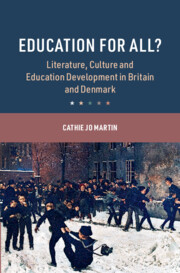Book contents
- Education for All?
- Cambridge Studies in the Comparative Politics of Education
- Education for All?
- Copyright page
- Dedication
- Contents
- Figures
- Tables
- Acknowledgments
- Note on the Text
- Introduction
- 1 Culture and the Politics of Comparative Education Policy
- 2 Culture and Continuity through Institutional Change
- 3 Romancing the Nation: Education and Nation-Building in 1800
- 4 Expanding Educational Access in the Age of Social Realism
- 5 Education in the Age of Empire, Globalization and Technological Change
- 6 Cultural Echoes of the Past in Contemporary Education Reforms
- Bibliography
- Index
4 - Expanding Educational Access in the Age of Social Realism
Published online by Cambridge University Press: 27 September 2023
- Education for All?
- Cambridge Studies in the Comparative Politics of Education
- Education for All?
- Copyright page
- Dedication
- Contents
- Figures
- Tables
- Acknowledgments
- Note on the Text
- Introduction
- 1 Culture and the Politics of Comparative Education Policy
- 2 Culture and Continuity through Institutional Change
- 3 Romancing the Nation: Education and Nation-Building in 1800
- 4 Expanding Educational Access in the Age of Social Realism
- 5 Education in the Age of Empire, Globalization and Technological Change
- 6 Cultural Echoes of the Past in Contemporary Education Reforms
- Bibliography
- Index
Summary
Britain developed a public education system in 1870 but eliminated alternative schools for poor children on the basis of their poor quality. In 1855, Denmark prioritized expanding access over quality standards, by supporting private evangelical schools serving rural populations. Cultural frames informed these struggles over education. For British authors, education would build character and social stability, and the left endorsed workers’ rights to schooling; yet even sympathetic Victorian social reform novelists worried about the culture of poverty and missed the social investment benefits of workforce training. Their depictions of quality problems helped to close schools and reduce access. Alternatively, Danish authors supported education as a means of producing useful citizens and did not worry about a culture of poverty. Danish authors depicted a government in benign terms and affirmed the importance of local government self-determination. British and Danish authors participated in movements to expand schooling to underserved populations. British writers Charles Dickens, Charles Kingsley, and Elizabeth Gaskell wrote heart-wrenching stories that stirred charitable impulses toward the poor; Matthew Arnold directly shaped the 1870 legislation. Danish authors such as NFS Grundtvig and Bernhard Severin Ingemann inspired the free school and folk high school movement that greatly expanded education among rural peasants.
Keywords
- Type
- Chapter
- Information
- Education for All?Literature, Culture and Education Development in Britain and Denmark, pp. 113 - 159Publisher: Cambridge University PressPrint publication year: 2023



